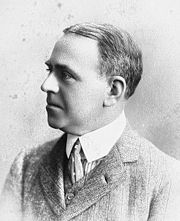Mystery Books
Mystery Movies
Mystery Authors
E. Phillips Oppenheim biography
Edward Phillips Oppenhei was bestselling and very popular English novelist. He was featured on the cover of of Time magazine in 1918, and was considered the "prince of storytellers." He wrote more than hundred novels, most of which were suspense and international thrillers, as well as romances, comedies, and parables of everyday life. Oppenheim's most famous character was General Besserley, the protagonist of General Besserley's Puzzle Box and General Besserley's New Puzzle Box (one of his last works).
Oppenheim's work possesses a unique charm, featuring protagonists who delight in Epicurean meals, surroundings of intense luxury, and the relaxed pursuit of criminal practice, on either side of the law.
Born in London, England, his father, Edward John Oppenheim was a leather merchant. His mother was Henrietta Susannah Temperley Budd. "Oppy" as he was called when young attended the Wyggeston and Queen Elizabeth I College in Leicester. When he was sixteen he left school to assist his father in his leather business, which he stayed in for more than twenty years. When his father died, Oppenheim began to extricate himself from the business to concentrate on his writing. His home was The Cedars, Main Street in Evington from 1897 to 1905. His first novel was about England and Canada, called Expiation (1887); followed by such titles as Monk of Cruta (1894), Mysterious Mr Sabin (1898), A Millionaire of Yesterday (1900), The Yellow Crayon (1903), The Malefactor (1906), Jeanne Of The Marshes (1909), The Illustrious Prince (1910), Havoc (1911), and The Tempting of Tavernake (1912).
Oppenheim travelled in England and the continent on business, and he went to the United States in 1892 where he met his future wife Elsie Clara Hopkins of Easthampton, Massachusetts, with whom he would have one daughter, Josephine. They settled in the Leicester area and had a happy marriage for many years, despite rumors that Oppenheim had affairs. In 1905 the family moved to rural Sheringham in the northern reaches of Norfolk County. A year later, having already published more than thirty books, his move to the country and life as a country squire brought on a prolific period of writing.
In 1914 when World War I broke out, Oppenheim was appointed to the Ministry of Information in London, for which he would travel with journalists to the front in France. After the war the Oppenheim's moved to London, then Devon and Surrey counties, then on to Norfolk where they bought Reepham House. But they would not stay long as memories of the glamorous Côte d'Azur were calling Oppenheim back to France. His increasing income from book sales helped the family to make the decision. Some of his next titles to be released were The Vanished Messenger (1914), Mr Grex of Monte Carlo (1915), The Kingdom of the Blind (1917), The Zeppelin's Passenger (1918), The Great Impersonation (1920) which sold over a million copies, The Devil's Paw (1920), and The Evil Shepherd (1922).
The Oppenheim's sold their home and purchased Villa Deveron, at Cagnes-sur-Mer between Cannes and Nice, where Oppenheim could play golf, gamble, and indulge in a favourite pastime, sailing his yacht, Echo I. He continued to produce short stories and novels which he would dictate to his secretary, the majority of which he sold to American magazine publishers in advance of book sales. On 12 September, 1927 Time magazine featured Oppenheim on its cover for a second time.
To avoid the death duties in France the Oppenheim's sold their Villa and in 1934 they bought a home called `Le Vauquiédor' in Guernsey in the Channel Islands, dividing their time between there and the Riviera. In 1938 they purchased a home near Grasse on the Riviera. When France collapsed the next year, they were temporarily trapped, but eventually escaped via Spain and Portugal and returned to England in 1941. They were officially "home" when in 1945, despite their frail health, they hired a yacht to travel on to Guernsey and, with some difficulty, repossessed their home on the island. Envoy Extraordinary was published in 1937, and Oppenheim's autobiography The Pool of Memory was published in 1941.
After years of prostate problems, E. Phillips Oppenheim died on 3 February 1946 in St. Peter Port, Guernsey, Channel Islands. Oppenheim left behind several screen adaptations and many of his stories were made into movies.
Information source: wikipedia
